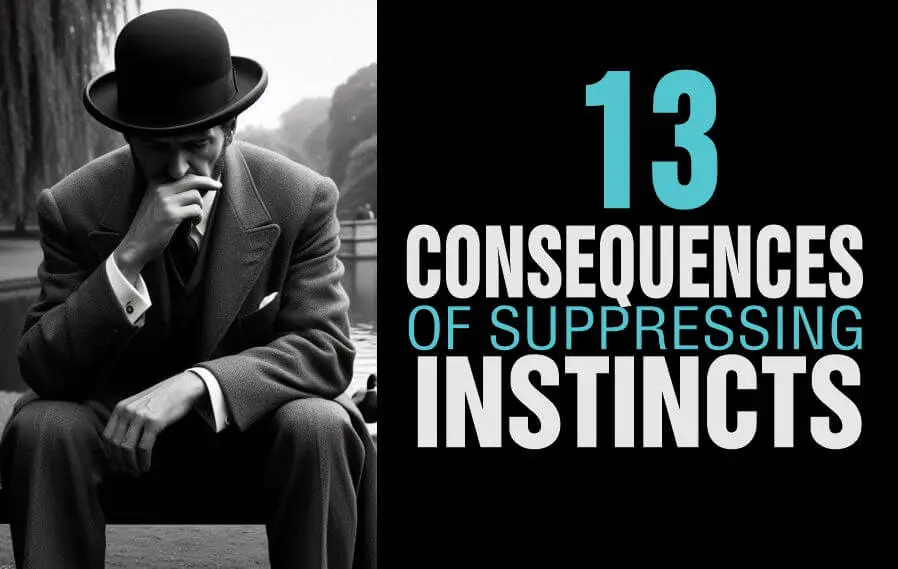Last updated on June 5th, 2025 at 04:26 pm
Discover 13 consequences of suppressing your instincts and what you should do instead.
Suppressing basic instincts can have detrimental effects.
Human beings are complex creatures with a delicate balance of rationality and instincts.
Instincts are deeply ingrained within our genetic makeup, forming the foundation of our survival and decision-making processes.
Unfortunately, the demands of modern society often require us to suppress these innate urges, leading to various consequences affecting our mental, emotional, and physical well-being.
In this article, we will explore thirteen potential consequences that may arise when you ignore or suppress your instincts, and how to avoid such.
Table of Contents
- Consequences of Suppressing Your Instincts
- What to Do to Strike a Balance
- Frequently Asked Questions
- Final Word from The Conducts of Life
Consequences of Suppressing Your Instincts

1. Increased Stress and Anxiety
Suppressing instincts can lead to heightened stress and anxiety levels.
Your instincts often serve as early warning mechanisms, alerting you to potential dangers or stressful situations.
Ignoring or shutting down these instinctual responses can strain your mental health, leading to a constant state of anxiety.
This suppression can lead to a disconnection from your natural inclinations, causing internal conflict and a sense of unease.
Without an outlet for these instincts, you may feel a heightened sense of tension and worry, as you are denying a fundamental part of your being.
This can manifest as chronic stress and anxiety, impacting mental and emotional well-being.
Related: Basic Instincts vs Emotional Intelligence
2. Poor Decision-making
Instincts are designed to help you make rapid decisions based on survival and self-preservation.
By suppressing these instincts, you hinder your ability to assess and respond to situations instinctively.
This can result in poor decision-making, as you rely more on rationality alone, which may not always consider crucial instinctual information.
These instincts often serve as valuable sources of intuition and gut feelings, guiding you in making sound choices.
By ignoring or suppressing these instincts, you lack this innate wisdom, leading to impulsive or ill-considered decisions.
Without the influence of instincts, you may struggle to make decisions that align with your true needs and desires, resulting in negative outcomes and regret.
Related: How Basic Instincts Keep you Alive
3. Disconnection from Authenticity
Suppressing instincts can lead to a disconnection from your true self.
These instincts are part of your inherent nature, contributing to your identity and individuality.
By denying or suppressing them, you risk losing touch with your authentic desires, needs, and emotions.
These instincts often reflect your truest desires and inclinations, and by suppressing them, you may feel out of touch with your genuine self.
This disconnection can result in a lack of fulfillment and a sense of living inauthentically.
Without honoring these instincts, you may struggle to align your actions with your core values, leading to a pervasive feeling of being disconnected from your true identity and purpose.
Related: Harnessing Basic Instincts in Modern Society
4. Heightened Aggression
Instincts, such as the fight or flight response, exist to keep you safe in threatening situations.
When suppressed, the natural outlet for these intense emotions may disappear, leading to pent-up aggression.
Without proper release, this aggression may manifest in unhealthy ways, potentially damaging relationships and overall well-being.
Basic instincts often serve as natural outlets for pent-up energy and emotions.
By suppressing them, you may find yourself unable to release these feelings in a healthy manner, leading to increased aggression.
This can manifest as irritability, anger, or even explosive outbursts.
Without the ability to express basic instincts in a balanced way, you may struggle to manage your emotions, resulting in heightened aggression and conflict.
Related: The 5 Basic Instincts of Humans
5. Diminished Intuition
Intuition acts as a guiding force in decision-making, allowing you to tap into deeper aspects of your subconscious mind.
Suppressing instincts weakens your ability to access this intuitive wisdom.
We become disconnected from our gut feelings and struggle to make intuitive judgments, negatively impacting our ability to navigate life’s complexities.
Basic instincts are sources of deep-seated wisdom and guidance.
When you suppress them, you find yourself disconnected from your intuitive sense, leading to uncertainty and indecision.
Without the influence of instincts, you struggle to tap into your innate understanding of situations, leading to a diminished ability to make insightful decisions and navigate life with confidence and clarity.
Related: Should You Trust Your Instincts?
6. Unfulfilled Needs and Desires
Instincts drive your fundamental needs and desires, such as the need for connection, intimacy, and self-expression.
Suppressing these instincts can lead to unfulfilled desires and a lack of satisfaction in various areas of life, including relationships, career, and personal growth.
Instincts often reflect your fundamental requirements for well-being and fulfillment.
When you suppress them, you overlook or dismiss your genuine needs and desires, leading to a sense of emptiness and dissatisfaction.
When this happens, you struggle to address your true desires, resulting in a persistent feeling of unmet needs and unfulfilled aspirations.
Related: Understanding the Hero Instinct
7. Mental Exhaustion

Suppressing instincts can be mentally exhausting.
Constantly fighting against natural instincts requires significant effort and mental energy, leaving you drained and fatigued.
Over time, this exhaustion can impact your overall well-being and hinder your ability to function optimally.
This suppression can lead to a constant internal struggle as you try to override your natural inclinations.
The cognitive effort required to suppress these instincts can be draining, leading to mental fatigue and decreased cognitive function.
This can result in a persistent state of mental exhaustion, impacting overall well-being and making it challenging to focus, make decisions, and cope with daily stressors.
Related: Triggering a Man’s Hero Instincts
8. Disrupted Emotional Balance
Instincts are closely intertwined with our emotions.
Suppressing these instincts disrupts the natural flow of emotional expression, leading to a lack of emotional balance.
Unresolved emotions can build up over time and result in emotional outbursts or emotional shutdowns.
The instincts play a crucial role in regulating emotions and responding to internal and external stimuli.
When ignored, you stand the risk of emotional turmoil, as these instincts are integral to maintaining emotional equilibrium.
Without their influence, you may struggle to manage your feelings effectively, leading to heightened emotional volatility, mood swings, and a general sense of instability.
This disruption can impact relationships, mental well-being, and overall quality of life.
9. Decreased Creativity and Innovation
Creativity often thrives when you embrace your instincts.
When you suppress or ignore them, your ability to tap into creative and innovative thinking may decline.
This can limit your problem-solving capabilities, affecting various aspects of life, including work, personal projects, and overall personal growth.
If ignored, you find yourself constrained by conventional norms, inhibiting your ability to think outside the box and generate innovative ideas.
Without the influence of basic instincts, you struggle to tap into your creative potential, resulting in a diminished capacity for originality and inventive thinking.
This can stifle personal and professional growth, hindering progress and adaptation to new challenges.
10. Weakened Personal Boundaries
Instincts play a crucial role in setting and maintaining personal boundaries.
They aid in recognizing and asserting our needs and values.
Suppressing these instincts can result in weakened boundaries, making it difficult to establish healthy boundaries with others.
This can lead to resentment, coercion, and a compromised sense of self.
Instincts guide us in asserting our needs and setting limits.
When this is compromised, we may struggle to establish and maintain healthy boundaries, leading to a susceptibility to manipulation and an inability to protect our well-being.
Without the influence of basic instincts, we may find it challenging to assert ourselves, resulting in compromised personal boundaries and an increased vulnerability to emotional and psychological harm.
11. Physical Discomfort and Health Issues
Ignoring instincts can trigger physical discomfort and health problems.
Our instincts often influence our bodily responses, signaling when we need rest, nourishment, or exercise.
Ignoring these signals can lead to chronic fatigue, malnutrition, and other physical ailments.
Basic instincts often guide behaviours that support physical well-being.
When ignored, you neglect your body’s natural signals, leading to stress-related ailments, such as headaches, muscle tension, and digestive problems.
Additionally, the suppression of instincts can lead to chronic stress, which is linked to a range of health issues, including cardiovascular problems and weakened immune function.
Ignoring these instincts can thus have a detrimental impact on overall physical health and comfort.
12. Decline in Intimacy and Relationships

Instincts play a vital role in human connection and intimacy.
Suppressing these instincts can diminish your ability to empathize, trust, and establish meaningful connections.
This can strain intimate relationships, resulting in feelings of detachment or emotional disconnect.
Without the influence of instincts, you may find it challenging to express your true feelings and desires, ultimately impacting the depth and quality of your relationships, leading to a decline in overall intimacy.
13. Regret and Unfulfilled Potential
Suppressing instincts can lead to a lifetime of regret and unfulfilled potential.
Denying your instincts can result in a lack of life experiences, missed opportunities, and a failure to seize moments that could have contributed to personal growth, happiness, and fulfillment.
These instincts guide us toward opportunities for growth and fulfillment.
When suppressed, you may miss out on experiences that align with your authentic self, leading to a sense of regret and unfulfilled potential.
Without the influence of instincts, you struggle to pursue paths that resonate with your true aspirations.
This can result in a lingering sense of missed opportunities and unrealized possibilities, ultimately leading to regret and a sense of unfulfillment.
What to Do to Strike a Balance
Acknowledging your basic instincts and striking a balance with rationality requires the following steps:
- Self-awareness: Recognize and understand your basic instincts, such as fight-or-flight responses, nurturing behaviours, and social bonding.
- Mindfulness: Practice being present in the moment, allowing you to tune into your instincts and bodily sensations.
- Trust: Learn to trust your gut feelings and intuition, as they often stem from instincts honed by evolution.
- Balance: Strive to balance instincts with rational thinking, acknowledging their validity while considering the broader context.
- Self-care: Honour your physical needs, such as sleep, nutrition, and exercise, to support your instincts for survival and well-being.
- Emotional Expression: Allow yourself to express and process emotions in healthy ways, acknowledging their connection to instincts for social bonding and communication.
- Connection: Promote meaningful connections with others, acknowledging the importance of social instincts and the need for community and support.
- Adaptability: Embrace change and new experiences, acknowledging that instincts have evolved to help us adapt to different environments and challenges.
Frequently Asked Questions
What are the consequences of suppressing instincts?
Consequences include increased stress, poor decision-making, and disrupted emotional balance, impacting overall well-being.
2. How can suppressing instincts affect relationships?
It can lead to a decline in intimacy and weakened personal boundaries, impacting the depth and quality of relationships.
3. Can suppressing instincts lead to regret?
Yes, it can result in regret and unfulfilled potential, as individuals may miss out on fulfilling experiences.
4. What are the physical effects of suppressing instincts?
It can lead to physical discomfort, chronic stress, and health issues, impacting overall physical well-being.
Final Word from The Conducts of Life
Suppressing instincts has a wide array of consequences that affect our mental, emotional, and physical well-being.
While modern society often preaches the suppression of instincts to adhere to social norms, it is essential to strike a balance.
Acknowledging and understanding your instincts, and finding healthy ways to express them, can enable you to lead a more authentic, fulfilling life.
By embracing the wisdom of your instincts, you can tap into your natural abilities, making better decisions.
References:
- https://www.linkedin.com/pulse/consequence-ignoring-your-gut-instinct-karin-kelly-lawrenz
- https://adaringadventure.com/the-repercussions-of-ignoring-your-gut-instinct/
- https://fortune.com/2016/01/03/entrepreneur-instincts-missed-opportunities/
Pious Clements is the insightful voice behind "The Conducts of Life" blog, where he writes about life ethics, self-development, life mastery, and the dynamics of people and society.
With a profound understanding of human behaviuor and societal dynamics, Pious offers thought-provoking perspectives on ethical living and personal growth.
Through engaging narratives and astute observations, he inspires readers to navigate life's complexities with wisdom and integrity, encouraging a deeper understanding of the human experience and our place within society.

